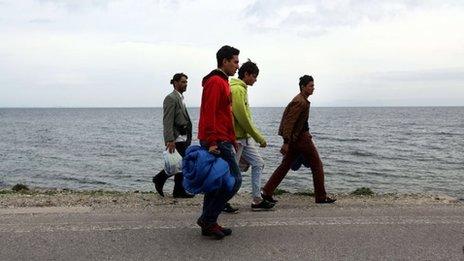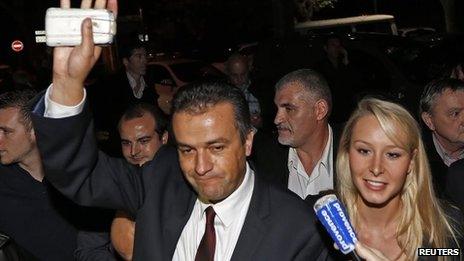Europe's far right surfs immigration wave
- Published

Unless the debate over immigration is transparent and believable it can make for toxic politics
Last week there were two unconnected events in Europe but, almost certainly, they will impact on each other.
In the waters off the southern Italian coast, nearly 400 migrants lost their lives trying to reach Europe.
In a minor by-election in Brignoles, a south-eastern town in France, the far-right Front National led by Marine le Pen won with 53.9% of the vote.
In the months ahead, leading up to the European elections in May 2014, immigration will be at the heart of European politics.
So far this year, 35,000 asylum seekers have arrived off the Italian coast - 25,000 were rescued at sea. The largest number - 10,000 - came from Syria. Almost as many came from the Horn of Africa.
The Italian Prime Minister, Enrico Letta, has called the Mediterranean the "sea of death". He has announced a state funeral for those who lost their lives in the worst incident.
He believes, as do most Italians, that migration should be managed at a European rather than a national level. The EU Home Affairs Commissioner Cecilia Malmstroem has called for the EU to deploy a vast maritime search-and-rescue operation to save lives.
Humanitarian contradiction
What officials are less keen to acknowledge is that the civil war in Syria and instability in Africa will have a significant impact in Europe. Tens of thousands of desperate people are looking to Europe as their means of escape from fear, war and poverty.
The politically sensitive reality is that at a time of record-high unemployment in Europe, immigration will rise. The humanitarian imperative to save lives clashes with the policy of many governments to curb immigration.
Of those migrants who have made it to Italy, 73% have already met the criteria for asylum. Many more quickly disperse through a borderless Europe. Many of those who arrive on the island of Lampedusa are, within days, on the road or on the trains to Northern Europe, tapping into established migrant communities.

Immigration has provided fertile ground for the advancement of the far right in France
And then there is the politics: In Brignoles, in France, the local aluminium mines closed in the 1990s. Unemployment is high and there is a large community of immigrants from North Africa. It is fertile ground for the Front National to make gains. Its leader Marine le Pen has pledged to end net immigration and to change the rules over families being allowed to join migrants that have already made it to France.
In the Netherlands, Geert Wilders's Freedom party is also surging in the polls. He wants to block immigration and has argued that it should not fall to Dutch taxpayers to host Syrians.
Both Le Pen and Wilders have their eye on the European elections. Next month they will explore forming a new far-right grouping within the European Parliament.
'Different tune'
In a recent French survey the Front National was placed in the lead in the polls when voters were asked how they would vote in the European elections, with 24%. To form a grouping in the European Parliament, 25 MEPs from seven member states are needed.
Wilders has said that "our parties could make the Europhile elite sing a different tune". These anti-establishment parties are often against further European integration and are benefiting from record levels of unemployment.
Prime Minister Letta said recently that there was a risk that "the most 'anti-European' European Parliament ever" could emerge from May's elections. He said that the "rise of populism is today the main European social and political issue".
President Hollande, in reference to the strength of the Front National said, "the only answer is to obtain results on jobs, on growth, on security and on solidarity".
The argument often descends into name-calling with the mainstream parties denouncing the "populists" of the right and the right railing against the European "elites". But unless the debate over immigration is transparent and believable, it can make for toxic politics.
The truth is that there are no easy options. The EU may help by providing centres at transit points where people can make asylum requests. That might reduce the numbers trying to enter Europe illegally. The EU can target smuggling rings and traffickers - but in the emerging chaos in Libya, that will be difficult.
In Morocco there is a "mobile partnership" scheme whereby the Moroccans agree to control their coastline in exchange for assistance and the EU increasing opportunities for legal migration through students visas and work permits. The scheme appears to have slowed illegal migration.
Some countries - noticeably Germany - need extra workers and have already accepted large numbers of refugees, but that is not the case throughout Europe.
Whatever Europe decides, it is clear a significant number of desperate people will risk everything to come to Europe. They will not be deterred.
It is also likely that if the seas are made safer, more will travel. The challenge for the mainstream politicians is to be honest and transparent with the voters over the implications of what is happening in the Middle East and Africa - otherwise there are anti-establishment parties in Europe who spy an opportunity to blame the elites.